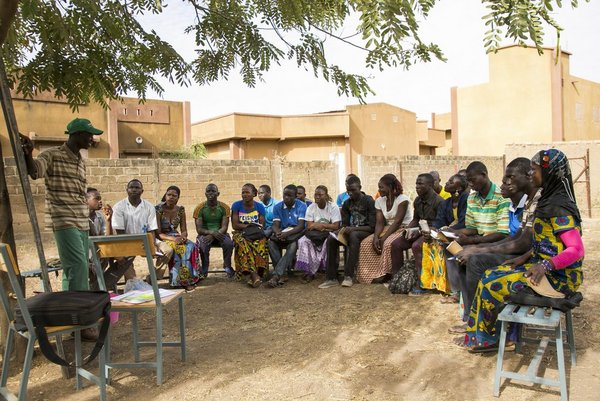 Read this article in French
Read this article in French- Share this article
- Subscribe to our newsletter
Helvetas in Mali – training for agriculture
In the course of time, the inhabitants of the semiarid Sahel Zone have developed farming techniques and production methods which are adapted to their extremely dry climate. This has enabled them to feed their families in normal years.
However, owing to climate change, circumstances are no longer normal. It has become impossible to predict when the rainy season starts and how long it will last. Frequently, there is not enough rainfall, or it may be very heavy and result in flooding. This puts a severe strain on the food security of families, whose provisions are often not sufficient to secure livings between two harvests.
Furthermore, smallholders frequently do not succeed in achieving good production and earning sufficient income since they have difficulty obtaining fertiliser and suitable seed; also, they often lack the technical abilities and have no access to information and extension services.
Young men and women, who account for the majority of the population, are particularly hard hit by this situation and currently have only few options to establish sound financial self-sufficiency. Many of them seek additional resources in rural areas or in the gold-mining districts, where they reckon with more employment opportunities.
In the context of a project called “Jigitugu” (“fulfilling hopes”), Helvetas is contributing to enhancing agriculture. Young farmers receive training in agricultural professions (agroecology, marketing new vegetable varieties, poultry farming). Tried and tested farming methods are modernised and adapted to climate imponderabilities, and production is oriented on local or regional markets.
For example, Karité shea butter, a traditional cosmetic product for skin care, has prospects of becoming established on regional or even international markets. Sesame and fonio, an ancient, drought-resistant grain variety, are increasingly desired by the middle classes in the cities.
High-quality training tailored to the needs of the communities
The project offers youths and women the opportunity to complete high-quality vocational training which is tailored to their needs. The short, practice-oriented courses are run by local experts. Farmers, livestock breeders and artisans impart the learners with new technologies and good animal husbandry practices, and they support them in compiling a business plan in order to be able to better market their products.
Farming experts identified within the community ensure continuous access among the smallholdings to innovation and technical advice.
Not only does this raise income among the youths and women, it also boosts their self-confidence, since they recognise that they themselves can actively contribute to a future in farming. In addition, they become aware that with their skills, they can promote the wellbeing of not only their families but the community as a whole, too.
Helvetas is also cooperating with the public sector in order that the latter can help improve the framework conditions for farming enterprises by contributing to promoting farming, animal husbandry and fisheries and to developing a high-quality vocational education and training system.
(Helvetas/wi)
More information:
How Helvetas supports people in Mali





Add a comment
Be the First to Comment